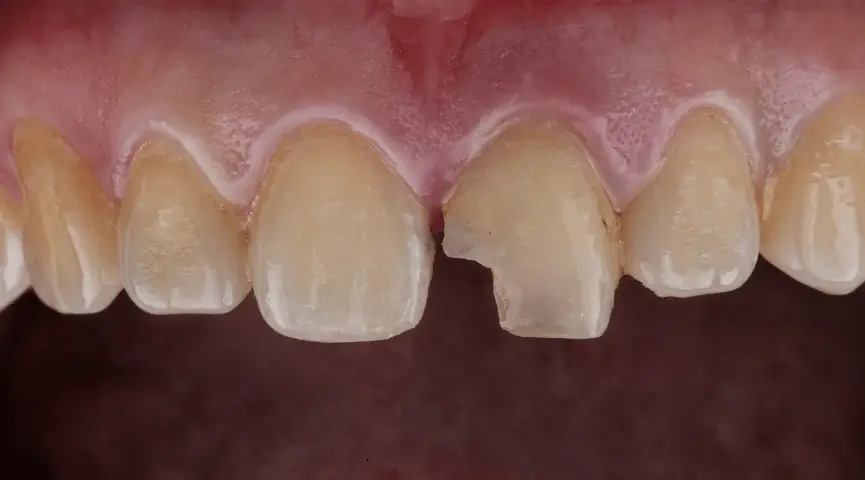
By Thrive Family Dentistry of Auburn | September 30, 2024
Chipped teeth are a common dental issue that many people experience at some point in their lives. Understanding the pain associated with chipped teeth is crucial for effective treatment and prevention. Chipped tooth pain can significantly affect daily activities, such as eating and speaking.
This blog aims to educate readers about the causes and symptoms of chipped tooth pain. By understanding these factors, readers can take proactive steps to address their dental health and seek appropriate care when needed.
What is a Chipped Tooth?
A chipped tooth occurs when a small piece of a tooth breaks off, leading to potential pain and discomfort. This can happen for various reasons, including physical trauma, decay, or other dental issues. A tooth may chip due to falls, sports injuries, or simply biting down on hard objects. For instance, studies show that around 25% of adults have undergone a chipped tooth.
Chipping can happen during activities like playing contact sports or biting into hard foods like nuts or ice. Additionally, dental decay can weaken teeth, making them more susceptible to damage.
Other common scenarios include accidents while playing sports or even from grinding teeth at night. Recognizing the signs and understanding the implications of a chipped tooth can help individuals seek timely treatment and avoid complications.
Common Causes of Chipped Tooth Pain
Physical Trauma
Physical trauma is one of the leading causes of chipped teeth. Accidents like slips, falls, or sports-related injuries happen in everyday life. For example, athletes often experience chipped teeth due to high-impact collisions or accidental blows to the mouth. Even a minor fall can cause a tooth to chip, especially if the person lands on their face.
Dental Decay
Dental decay, or cavities, can significantly weaken teeth. When tooth enamel erodes due to bacteria and plaque, the tooth becomes more vulnerable to chipping. Regular dental check-ups are crucial to catch cavities early and prevent further damage. If left untreated, decay can weaken the tooth’s structure, making it prone to chipping during routine activities.
Bruxism (Teeth Grinding)
Bruxism, or teeth grinding, often occurs during sleep. This condition puts immense pressure on teeth, leading to wear and chips over time. People who grind their teeth often do so unconsciously, making it essential to identify the problem early. Symptoms can include jaw pain or worn-down teeth. Night guards can help protect teeth from the effects of bruxism.
Biting Hard Foods
Certain foods can pose a risk to dental health. Biting down on hard objects, such as ice, hard candies, or nuts, can easily chip teeth. It is advisable to avoid hard foods, especially if you already have weak teeth or dental issues. Be cautious when consuming hard or crunchy foods, as they can cause unexpected damage.
Dental Procedures
Sometimes, dental treatments can inadvertently contribute to tooth chipping. For example, if a tooth has undergone a filling or crown placement, it may weaken in certain areas. Additionally, if the dentist improperly shapes a tooth during a procedure, it may lead to chips later. Regular follow-ups with your dentist can help identify potential issues before they escalate.
Symptoms of Chipped Tooth Pain
Sensitivity to Hot and Cold
Sensitivity to hot and cold temperatures is a common symptom of chipped teeth. When a tooth chips, it may expose sensitive nerves beneath the enamel. This can lead to sharp pain when consuming hot beverages or cold foods. The sensitivity can vary in intensity, often becoming more pronounced with time.
Pain or Discomfort
Chipped tooth pain can manifest as various discomfort levels. Some people experience sharp, stabbing pain, while others might feel a dull ache. This discomfort may worsen when biting down or applying pressure on the affected tooth. The pain can also come and go, making it challenging to identify the severity of the issue.
Visible Damage
Visible damage is often the most apparent sign of a chipped tooth. Jagged edges or missing pieces are telltale signs that a tooth has been chipped. The chipped area may appear discolored in some cases compared to the rest of the tooth. It is essential to monitor any visible changes in your teeth and seek professional help if necessary.
Swelling or Infection
In some cases, chipped teeth can lead to swelling in the gums or even infections. If a chip exposes the tooth’s inner pulp, bacteria can enter and cause an infection. Signs of infection may include swelling, redness, and pus around the affected tooth. Prompt dental care is crucial in these situations to prevent complications.
When to Seek Professional Help?
Knowing when to seek professional help for a chipped tooth is essential. If you experience severe pain, noticeable swelling, or visible damage, consult a dentist immediately. Additionally, if you notice any signs of infection, such as pus or persistent redness, you must seek help immediately.
Ignoring chipped tooth pain can lead to severe complications, including tooth loss or systemic infections. Bacteria entering the tooth through the chip can cause an abscess. An untreated abscess may lead to further dental issues or even affect overall health. Do not hesitate to contact a dentist for a proper diagnosis and treatment plan.
Treatment Options for Chipped Tooth Pain
Home Remedies
For temporary relief from chipped tooth pain, you can try home remedies. Over-the-counter pain relievers like ibuprofen can help reduce discomfort. Rinsing your mouth with warm saltwater can alleviate irritation and promote healing. It is advisable to avoid hard or crunchy foods until you see a dentist.
Dental Treatments
When visiting a dentist, several treatment options may be recommended based on the severity of the chip. Dental bonding or fillings can restore the tooth’s shape for minor chips. More severe cases may require a crown to protect the tooth from further damage. Your dentist will assess the situation and recommend the best course of action.
Preventative Measures
Preventing future chipping is essential for maintaining dental health. Wearing mouthguards during sports activities can protect your teeth from physical trauma. Additionally, avoid biting down on hard objects like ice or hard candy. Regular dental check-ups can help identify weaknesses in your teeth, allowing you to take proactive measures.
Understanding chipped tooth pain is vital for maintaining good dental health. Recognizing the causes and symptoms can help you seek timely treatment and prevent further complications.
If you experience chipped tooth pain, consult our dentist promptly. Prioritize your dental care and take the necessary steps to protect your teeth from damage. Remember, a proactive approach to dental health can lead to a brighter, healthier smile.



